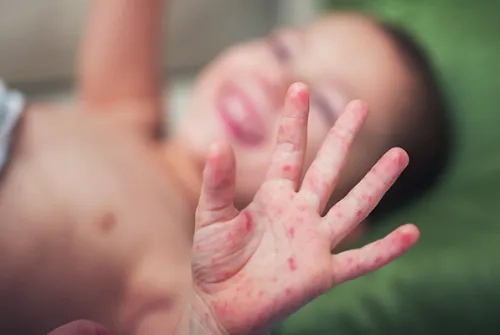Alo Yeditepe
Alo Yeditepe
‘Hand, foot, mouth disease’ Warning from the specialist of the subject: "It is more Common in Children Going to the Pool in Summer!”
Noting that hand, foot, and mouth diseases transmitted due to insufficient hand hygiene in environments such as kindergartens, and schools are more common, especially among children who go to the pool during the vacation period, Yeditepe University Kozyatağı Hospital Pediatrics Specialist Prof. Dr. Filiz Bakar warned that especially fluid intake should be paid attention to during this period and that the contact between the sick child and other children should be avoided.
Hand, foot, and mouth disease, which is one of the infectious diseases, especially affects children under 7 years of age. Reminding that one must be much more careful, especially for children going to a pool during the summer period, Yeditepe University Kozyatağı Hospital Pediatrics Specialist Prof. Dr. Filiz Bakar remarked, "One of the most important measures to prevent the disease is that the parents of the child in whom such an infection has been detected do not bring their child into contact with other children." Pointing out that adequate fluid intake is very important in children during the illness period, Prof. Dr. Filiz Bakar warned families that if their fluid intake is not sufficient, they should apply to a doctor.
“It Can Be Confused with Chickenpox”
Drawing attention to the fact that in addition to children, hand, foot, and mouth disease can be seen in adults, Prof. Dr. Bakar gave the following information about the symptoms of the disease:
“It may cause rashes, especially by occupying the hand, foot, and mouth areas. Rashes may be seen inside the mouth, and around the lips. The characteristic features of the rash are that it occurs on the hands and feet and is usually swollen and filled with liquid inside. For this reason, sometimes it is also confused with chickenpox. It is a disease that is especially common in summer and early autumn, which can lead to outbreaks in children.”
Rashes on the Palms and Soles of the Feet Make Diagnosis Easier
Indicating that the most typical feature of rashes on the hands and feet is that it occupies the palms and soles, Prof. Dr. Bakar said, "Rashes are seen on the palms and soles in general, which makes it easier to diagnose hand, foot, mouth disease. Since the rashes are not itchy, they can be distinguished from rashes arising from allergies. Rashes, sometimes accompanied by fever, begin to form on the first and second day of infection. It can take an average of a week for the disease to heal. Rashes limit themselves to a week. Everything recovers by itself.”
Rashes in the Mouth Cause Trouble
Noting that since it is an infectious disease, one of the symptoms seen in children is fever, Prof. Dr. Bakar said, "But the fever is usually not very resistant, it can last for 1-2 days. Here, the real trouble is the rashes inside the mouth, which are similar to canker sores. Since this process is painful, it disrupts nutrition and fluid intake, especially in young children. In this case, hospitalizing the children can become a necessity.
Entering the Pool in Groups Increases the Transmission
”The fact that children enter the pools in groups, especially in the summer, and therefore easily transmit the disease is a crucial factor in the increase of hand, foot, and mouth disease," Prof. Dr. Filiz Bakar said, continuing her words as follows:
"It is an infection originating from a virus spilling from the intestines, which is especially transmitted by hand. Therefore, hand contact is very important. In cases where hand hygiene is poor, which is sometimes difficult to ensure for children, they can transmit the virus to each other very easily when they are together.”
It Spills From the Intestines for Six Weeks and From the Respiratory Tract Secretions for Four Weeks
Stating that the virus will remain in the body and continue to spill for weeks, Yeditepe University Pediatrics Specialist Prof. Dr. Bakar continued his words as follows:
“The virus continues to spill from the intestines for about six weeks and from the respiratory secretions for four weeks. Since it is a virus that is resistant to the external environment and has a high level of contagiousness, it is necessary to pay close attention to hygiene rules in order to prevent an outbreak. Since it is a disease originating from a virus, supportive treatment is essential for us. As is the case with all virus infections, it is not mandatory to use antibiotics. If secondary infections occur, the use of antibiotics is a priority as a supportive treatment. If it does not disrupt the child's oral intake, a series of treatments are applied for wounds inside the mouth, and it is recommended to the families that the child take plenty of fluids.”
Apply to a Doctor If Fluid Intake Are Impaired
Emphasizing that it is possible to prevent the disease, Prof. Dr. Bakar made the following recommendations to the families: “If the child has this type of infection, parents must have their child avoid contact with other children. We recommend being more careful if they go to nursery, school, or enter the pool during the summer period. Since it is a disease that develops due to inadequate care taken of hand hygiene, parents must teach their children hand hygiene very well. On the other hand, the most important thing families must do for sick children is to ensure they receive sufficient fluid. If the child is taking sufficient fluid, there is no need for them to be uneasy. However, if fluid intake is impaired, especially in babies, they must apply to a specialist physician.”
Press Coverage: posta | cnnturk | cumhuriyet | turkiyegazetesi | aa | sabah | star | aksam | gazetevatan | haber7
About
Faculty and Year of Graduation:
Çukurova University Faculty of Medicine, 1992
”
See Also
- Does Breast Milk Protect Against Diseases?
- What is Heel Blood? Why is heel blood taken?
- How Can We Protect Children from COVID-19 Coronavirus?
- Special Care for Premature Babies
- What is the Goal in Newborn Intensive Care Treatment?
- Set the Rules from the Beginning!
- What is a Premature Baby and How to Feed it?
- It is Possible to Protect Children From Diseases with Simple Precautions
- Preschool Health Checks Increase Socialization and Success
- Ten Hints for Providing Care for Premature Babies
- Are Pre-School Health Checks Done?
- Keep It Away From Packaged Products To Strengthen Children's Immunity
- 648 Grams Born Baby “Umut” Succeeded in Clinging to Life
- High Fever in Children Article Series II
- Notice the Dangers in the School Bag!
- How Should the Development of a Baby Be?
- High Fever in Children
- Breastfed Babies Have Lower Blood Pressure, and Their Hearts are Healthier
Alo Yeditepe









